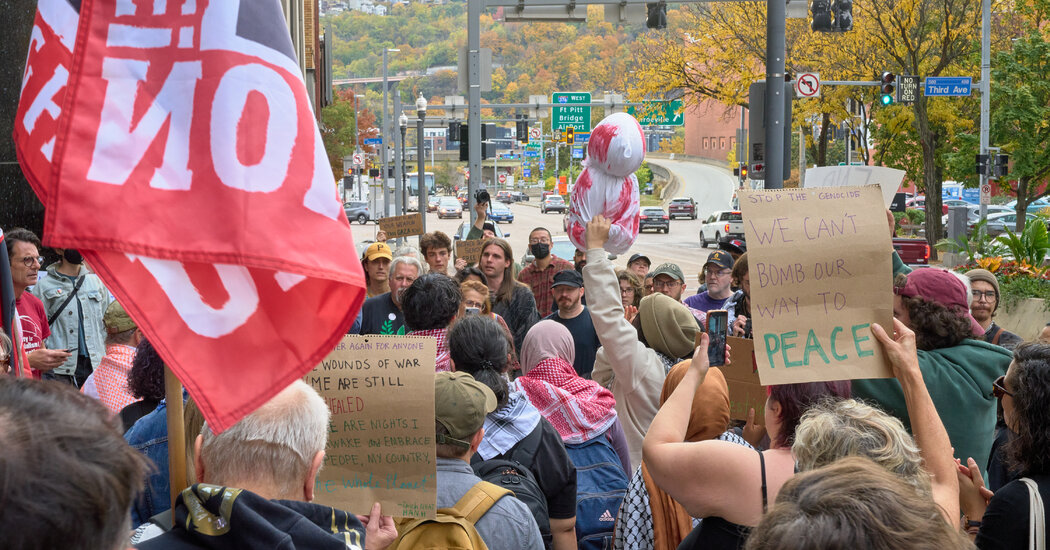
Representative Summer Lee of Pennsylvania, who joined calls for a cease-fire, has become one of several progressive lawmakers facing new pressure from primary challengers.
As Congregation Beth Shalom in Pittsburgh observed a special evening of prayer on Oct. 22 for the Israeli captives in Gaza, Representative Summer Lee, the progressive Democrat whose district includes the synagogue, paid her respects. She was late to arrive and could not stay long, but the rabbi, Seth Adelson, called her chief of staff the next day to offer his thanks.
Then on Wednesday, to the rabbi’s dismay, Ms. Lee was one of only 10 members of the House — nine of them Democrats from the party’s left flank — to vote against a bipartisan resolution “standing with Israel as it defends itself against the barbaric war launched by Hamas and other terrorists.”
Two days later, the Jewish community of Pittsburgh solemnly marked the fifth anniversary of the murder of 11 of its members by a white supremacist.
“I am a little disappointed that she has not been more proactive in finding the right language and forum in which to speak to and support her Jewish constituents on Israel,” Rabbi Adelson said in an interview, speaking slowly to choose his words carefully. His own son has been called to active duty in the Israel Defense Forces, and he added that the division in Ms. Lee’s district — racial, religious, ethnic — over Israel and Palestine “is not helpful.”
Perhaps nowhere in the United States is there a Jewish community more shaken by the wanton slaughter of Israelis by Hamas terrorists on Oct. 7 than in Pittsburgh, where the deadliest antisemitic attack in the nation’s history was perpetrated by a shooter who told police, “I just want to kill Jews.”
Those still-raw wounds could reopen as political leaders inside and outside the community exploit divisions over Israeli and Palestinian suffering — and amplify a brewing fight over Pittsburgh’s freshman representative in Congress, Ms. Lee.
Ms. Lee, 35, won a heated Democratic primary in 2022 against a Jewish lawyer, Steve Irwin, who was backed by much of the Democratic establishment, and by pro-Israel groups like the American Israel Public Affairs Committee and the Democratic Majority for Israel. Her victory was hailed as a breakthrough: She was the first Black woman elected to Congress from Pennsylvania.
But the newfound unity for Democrats that came with that triumph has been frayed since Hamas’s attack and with Israel’s punishing response. On Friday, in an interview as she headed to a remembrance of the attack five years before, she railed against Israeli actions that “look increasingly like a genocide of innocent Gazans, half of them children.” And she conceded: “I don’t think there’s a way to make everyone happy in politics. My job is to make everyone safe.”
“Israel is one issue; it’s an important issue to a subsection of our community,” she said. “But to pretend it’s the only issue is insulting and damaging.”
Such talk has already drawn Ms. Lee a challenger ahead of the April 23 primary: Bhavini Patel, a 29-year-old member of the borough council in suburban Edgewood, who suggested as the setting for an interview a cafe in Squirrel Hill, the heavily Jewish neighborhood of Pittsburgh where the Tree of Life shooting took place.
Ms. Patel’s biography could be her calling card: The daughter of Indian immigrants, she worked in her mother’s Gujarati food truck before becoming the first of her family to go to college. But since Hamas’s slaughter of 1,400 Israelis, Ms. Patel said she had been spending her time with the voters of Squirrel Hill, talking about a conflict half a world away.
“Something that keeps coming up in my conversations is that Congresswoman Lee continues to equivocate,” she said. “We’re responding to something that is evil — the murder, rape, kidnapping of children, men, women and grandparents. There shouldn’t be any equivocation on this.”
Ms. Patel’s could be one of many Democratic primary challenges buoyed by the confrontations between staunch defenders of Israel and lawmakers promoting Palestinian rights. In Minneapolis, Sarah Gad, a defense and civil rights lawyer, has challenged Representative Ilhan Omar, the former Somali refugee known for her clashes with Jewish colleagues.
In the northern suburbs of New York, George Latimer, the Westchester County executive, is contemplating a challenge to Representative Jamaal Bowman, who defeated the staunchly pro-Israel chairman of the House Foreign Affairs Committee, Eliot Engel, in 2020.
And progressive organizations are girding for possible challenges to Representatives Cori Bush of Missouri, Rashida Tlaib of Michigan and others, funded from the deep pockets of AIPAC and other pro-Israel groups.
“They spent a historic amount of money to intervene, and try and buy primaries in 2022,” said Usamah Andrabi, spokesman for Justice Democrats, the liberal insurgent group that helped elect many of the progressives now on the primary target list. “I think we will see a doubling and tripling down, because no one in the Democratic leadership is trying to stop them.”
Officially, AIPAC is neutral for now.
“There will be a time for political action, but right now our priority is building and sustaining congressional support for Israel’s fight to permanently dismantle Hamas,” said the group’s spokesman, Marshall Wittmann.
But AIPAC’s jabs have already begun. Responding to a post by Mr. Bowman extolling his “Ceasefire Now” resolution, the lobbying group called it “a transparent ploy to paint Israel as the aggressor and allow Hamas to control Gaza.” Hitting Ms. Lee, AIPAC wrote on X, “Emboldening a group that massacres Israelis and uses Palestinians as human shields will never achieve peace.”
Waleed Shahid, a former leader of Justice Democrats, predicted that the current environment, in which leaders of both parties, including President Biden, are aligned with Israeli leadership and the Palestinian cause is represented by protesters in the streets and on college campuses, would yield a trove of fund-raising for pro-Israel groups ahead of 2024. He suggested that there may be an “asymmetrical” fight during the primaries.
“I think we’re in a post-9/11 environment where there’s a lot of fear to speak out against war, and there could be political electoral consequences for not lining up for the cause of war, the way there was in 2002,” he said.
Progressive Democrats like Ms. Lee have other constituents to consider, including progressive Jews who remain by her side. Avigail Oren, a nonprofit professional in Pittsburgh, said that the Tree of Life attack led her to conclude that Jewish safety rested with securing the safety of all vulnerable communities, especially those targeted by white supremacists. That propelled her to work toward Ms. Lee’s election, she said, and her support for the congresswoman “was reinforced, not shaken” by the events in Israel, which she said underscored the need for an Arab-Jewish-Muslim alliance.
Ms. Lee said Jews were “10 percent of our district, but we also have Muslim, Arab, Palestinian constituents who are afraid for their families and their lives.”
But for many Jews, especially Jewish Democrats, the emotional cost of the conflict goes beyond politics. Older Jews, recoiling still from the carnage in Israel, find themselves confronted even by their children, who see the Israeli-Palestinian conflict in starkly different terms than the post-Holocaust narrative of heroic Zionism on which they were raised. The Israeli pioneers who made the desert bloom and defended the new state with their lives have been replaced, in a newer narrative, by colonial settlers displacing and oppressing the Holy Land’s rightful inhabitants.
In Pittsburgh, the politics of division are acutely painful, a fact acknowledged by Ms. Lee on Oct. 20, as she stood under an umbrella on a rainy day outside of the Capitol and said, “Peace means that we hold space for each and every one of our communities, including my Jewish community.”
But she stood her ground on her demand that Israel cease its retaliatory action against Gaza, threatening to use Congress’s “power of the purse” to force it, because, she said, “when the political pressure is on us the most, even when the spotlight is looking right at us, those are the moments where even if our voice quakes, or our knees shake, we have to speak out.”
Mr. Irwin, now a judge on the Pennsylvania court of judicial discipline, hesitated before saying that “some people feel betrayed” by Ms. Lee. After she prevailed over Mr. Irwin by 988 votes in a five-way primary, he endorsed her, and she endorsed the right of Israel to exist as a Jewish state.
Mr. Irwin had been a cantor at the Tree of Life Congregation for three years. He knew those who died and those who survived with grievous wounds.
“We know what it’s like to lose a life. We can put faces to names. It’s incredibly painful,” he said, as he pleaded with those who have so quickly shifted attention from the 1,400 dead Israelis to the dead and dying Palestinians in Gaza. “Just acknowledge the massacre,” he said. “We lost 11 folks. They lost more than 100 times that.”


